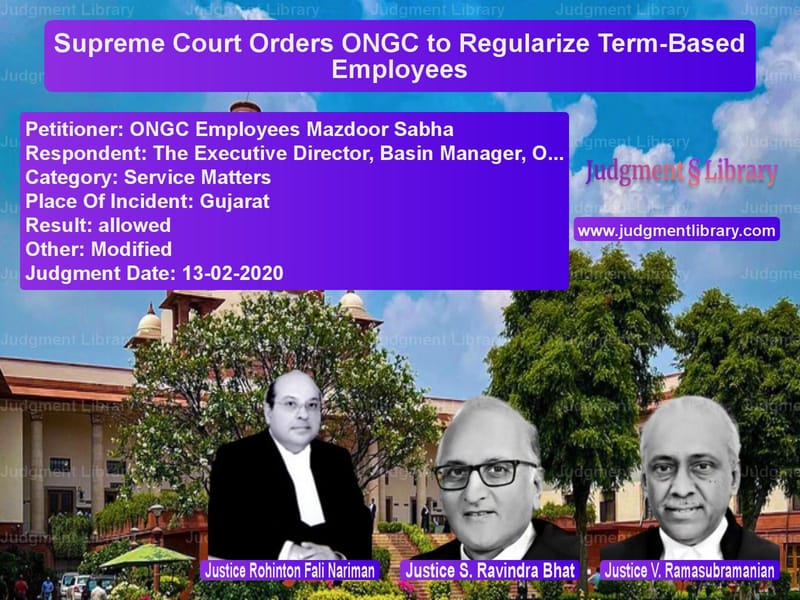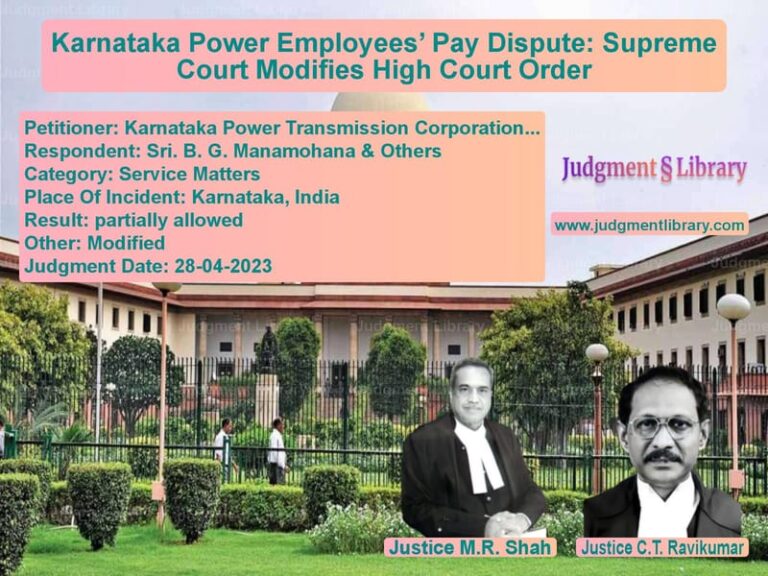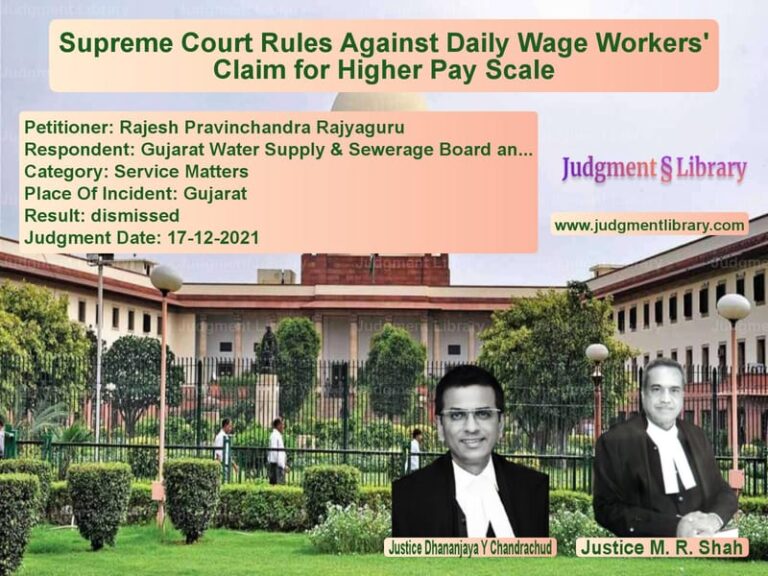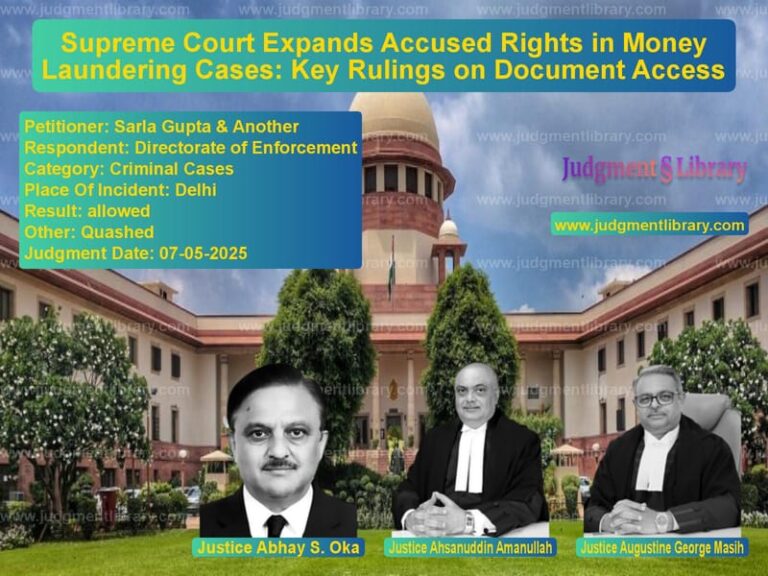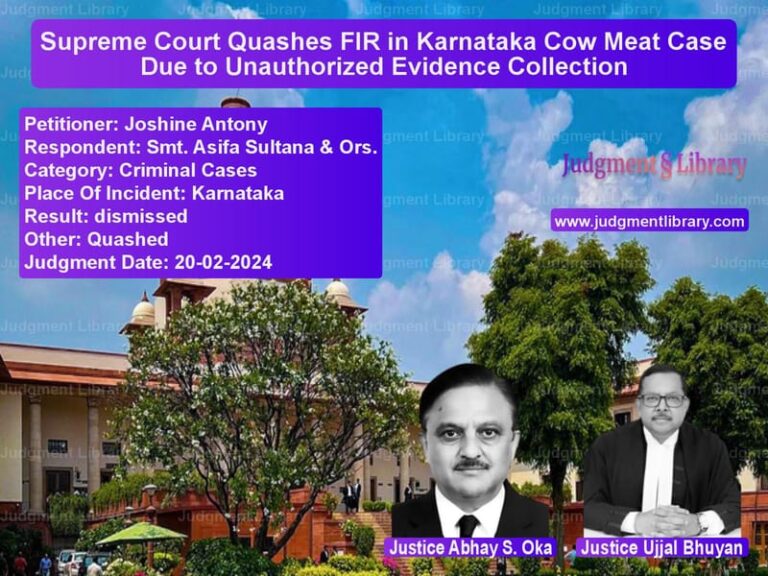Supreme Court Orders ONGC to Regularize Term-Based Employees
The case of ONGC Employees Mazdoor Sabha vs. The Executive Director, Basin Manager, Oil & Natural Gas Corporation (India) Ltd. is a crucial judgment where the Supreme Court directed the regularization of certain term-based employees of ONGC. The ruling clarified the application of labor laws and industrial dispute resolutions in cases of contractual employment.
Background of the Case
Between 1999 and 2001, ONGC recruited around 800 employees for Class III and IV posts on a four-year term basis without issuing public advertisements in newspapers. This recruitment was done by calling for names from the Employment Exchange. The ONGC Employees Mazdoor Sabha, a labor union, demanded regularization of 577 such employees.
In 2003, conciliation proceedings failed, leading to the referral of an industrial dispute to the Industrial Tribunal in Ahmedabad with the following question:
“Whether the demand of the ONGC Employees Mazdoor Sabha, Baroda, to give regular appointment to 577 term-based appointees (list enclosed) is proper or just? If so, what relief are the workmen entitled to?”
On November 8, 2011, the Industrial Tribunal partially allowed the reference, directing ONGC to regularize certain employees. However, this decision was challenged in the Gujarat High Court.
Arguments of the Petitioner (ONGC Employees Mazdoor Sabha)
- The employees had undergone a proper selection process, including interviews, and had been working for several years.
- The only irregularity in their recruitment was the lack of a public advertisement, which should not be held against them.
- Since many employees had completed over 240 days of continuous service in a calendar year, they should be regularized as per the Industrial Disputes Act.
- The workers had a legitimate expectation of permanent employment.
Arguments of the Respondent (ONGC)
- The employees were recruited on a fixed-term basis, and their contracts explicitly mentioned that they would not be regularized.
- ONGC had followed due process by involving the Employment Exchange in the recruitment.
- The recruitment was irregular as it did not follow the necessary open-market advertisement.
- Only employees who were recruited through proper competitive processes could be considered for regularization.
Supreme Court’s Judgment
A bench comprising Justice Rohinton Fali Nariman, Justice S. Ravindra Bhat, and Justice V. Ramasubramanian ruled in favor of the employees and directed ONGC to regularize certain employees from the date of the industrial dispute referral.
“As soon as the four-year period got over, the employees collectively approached the Central Government, leading to the referral of an industrial dispute. Hence, they must be regularized from the date of this referral.”
The Court emphasized that while public advertisements were not issued, the recruitment process otherwise followed due diligence, including interviews and merit-based selections.
“The only irregularity in the appointment was the lack of a public advertisement, apart from which every other condition for employment was met.”
The Court modified the High Court’s decision and ruled:
- Employees who were still in service must be regularized from December 21, 2004 (the date of the industrial dispute referral).
- They were entitled to all actual benefits from that date till April 1, 2013.
- Any directions preventing ONGC from recruiting new employees until term-based employees were regularized were removed.
Key Takeaways from the Judgment
- Fixed-term employees can be regularized: If they meet eligibility criteria and have completed continuous service.
- Public advertisement is important but not absolute: The Court recognized that a lack of public notice does not necessarily invalidate employment.
- Industrial dispute referrals play a crucial role: The date of the referral was considered the basis for regularization.
- Labor laws must be interpreted in favor of employees: Courts will ensure that employment contracts do not unfairly disadvantage workers.
Impact of the Judgment
This ruling has major implications for labor disputes and industrial policies:
- It ensures that companies cannot arbitrarily deny regularization to contractual employees.
- It provides clarity on the role of industrial dispute referrals in determining employment status.
- It reinforces the principle that recruitment irregularities should not unfairly penalize employees.
Conclusion
The Supreme Court’s decision in ONGC Employees Mazdoor Sabha vs. The Executive Director, Basin Manager, Oil & Natural Gas Corporation (India) Ltd. provides significant relief to term-based employees by ensuring that they receive the benefits of regularization. The judgment upholds the principles of fair employment practices and prevents arbitrary termination of workers who have provided long-term service.
Petitioner Name: ONGC Employees Mazdoor Sabha.Respondent Name: The Executive Director, Basin Manager, Oil & Natural Gas Corporation (India) Ltd..Judgment By: Justice Rohinton Fali Nariman, Justice S. Ravindra Bhat, Justice V. Ramasubramanian.Place Of Incident: Gujarat.Judgment Date: 13-02-2020.
Don’t miss out on the full details! Download the complete judgment in PDF format below and gain valuable insights instantly!
Download Judgment: ONGC Employees Mazdo vs The Executive Direct Supreme Court of India Judgment Dated 13-02-2020.pdf
Direct Downlaod Judgment: Direct downlaod this Judgment
See all petitions in Employment Disputes
See all petitions in Public Sector Employees
See all petitions in Recruitment Policies
See all petitions in Termination Cases
See all petitions in Judgment by Rohinton Fali Nariman
See all petitions in Judgment by S Ravindra Bhat
See all petitions in Judgment by V. Ramasubramanian
See all petitions in allowed
See all petitions in Modified
See all petitions in supreme court of India judgments February 2020
See all petitions in 2020 judgments
See all posts in Service Matters Category
See all allowed petitions in Service Matters Category
See all Dismissed petitions in Service Matters Category
See all partially allowed petitions in Service Matters Category

